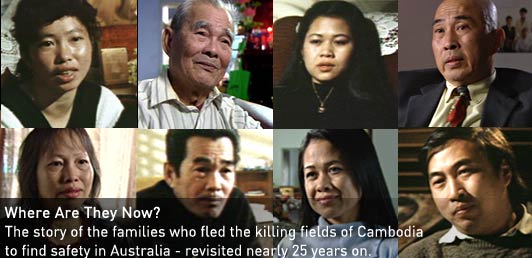Reporter: Marian Wilkinson
Producer: Janine Cohen
Broadcast: 27/06/2011
Four Corners - ABC Australia
The story of the families who fled the killing fields of Cambodia to find safety in Australia, revisited nearly 25 years on. What are they doing? Did they find a home? And what does their experience tell us about the current debate over refugee arrivals?
In 1987, with debate raging over refugee policy in Australia, Four Corners told the story of four families who came to this country in search of refuge and a future. The stories they told about life under Pol Pot were difficult to hear. Now reporter Marian Wilkinson returns to those same families and asks them about their struggle to remake their lives in a new country. Speaking frankly, they tell her the good and the bad - the moments of triumph and despair, and what it means for them to be an Australian.
For many Cambodian refugees, their story began on 17th April 1975 when Pol Pot's murderous Khmer Rouge took over the capital of their country, Phnom Penh. What followed was horror on a shocking scale. People were driven into the countryside where hundreds of thousands were killed. Others were forced into labour gangs and worked to death. In all, 1.7 million people lost their lives. In the years between Pol Pot's arrival and the tumult of the Vietnamese invasion of the country, many Cambodians fled seeking refuge.
In Australia a major debate began about the community's responsibility to these people. In that highly charged atmosphere, reporter Marian Wilkinson sought out four families who made it to Australia to hear what they had been through and why they wanted to live here.
There is little doubt that anyone watching would have felt sympathy for 11-year-old Keang, who was forced to stand with many other children whilst the Khmer Rouge soldiers brutally executed one of her friends for stealing food to feed another child. Others told how they listened to the screams as death squads clubbed their friends and families to death without any explanation. The program left little doubt these people needed the Australian community's help. What it couldn't answer was a much bigger question: could the refugees find a place in a society so different from their own?
Now with the debate over refugees once again taking centre stage, Four Corners revisits the families to find out how their lives have turned out. We hear how they have struggled to come to terms with a new country that was not always welcoming. Some tell how they married, had children; some began businesses that succeeded, others went bust and even lost their homes. The families also talk about the stresses that developed between the generations that came to Australia and the children who were born here. Despite this, the program shows that the next generation seems to have adjusted well to a new society. Many have found success here, and their parents make it clear how grateful they are to have found a home in Australia.
Stepping back from the deeply personal insights each person gives, for anyone forming a successful immigration and refugee policy, there are clear lessons. Giving refuge is one thing, but helping people find a new homeland requires care, understanding and resources.
'Where Are They Now?', presented by Kerry O'Brien, goes to air on Monday 27th June at 8.30pm on ABC1. It is replayed on Tuesday 28th June at 11.35pm. The program can also be seen on ABC News 24 at 8.00pm Saturdays. It is also available on ABC iview and at abc.net.au/4corners.


























5 comments:
The ennemies of Lord Buddha are:
1 Mao Setong
2 Ho Chiminh
3 Sihanouk
4 Taliban
Before the age of the internet 1987, I might have heard about this non-reception of refugees that landed on the shore of Australia. I heard or read how a Korean man fought for their rights to land there and be accepted by the Australian government. I cannot imagine of turning them back to Sea if they were boat people. I remember my heart rejoicing for the brave Korean man intervened on their behalf.
KhmerIsrael
All of them 110% Khmer Chen. Which mean Chinese living in Cambodia since Funan/Chenla era. Census comparison Khmer Chen 70% above compare to 30% pure Khmer average.
You all guys, need to see your mental check up.
If you've made your comment from a foreign country than your birth country, you are also part of your saying...
the ennemie of lord Buddha,s ah yuon vietcong TEP VONG.
Chum Kosal
Post a Comment